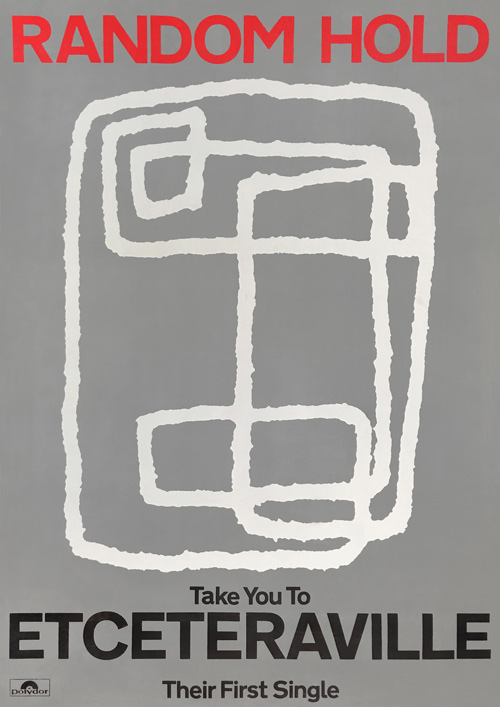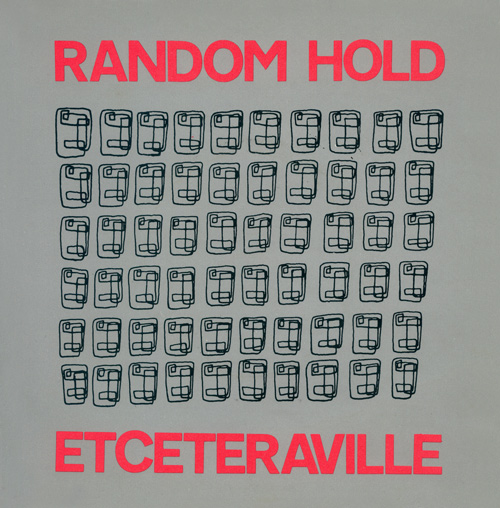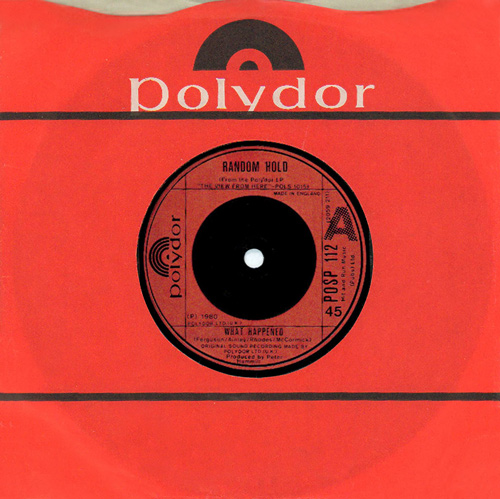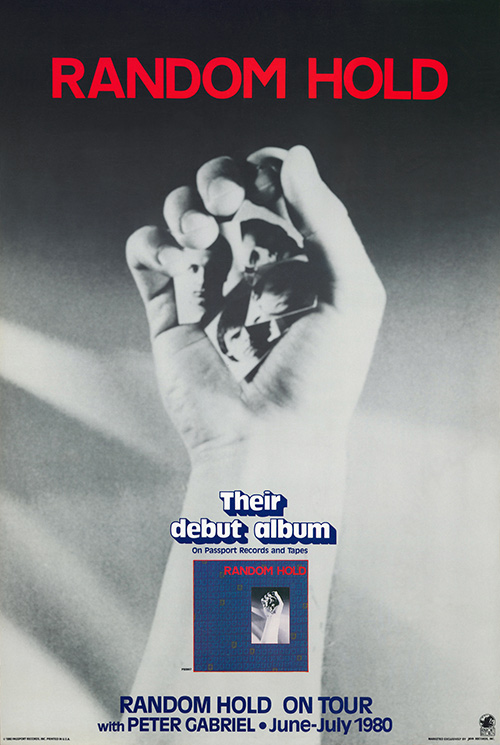


Previously on Random Hold:
Disappointed by an 801 concert David Rhodes (guitar, vocals) and David Ferguson (keyboards, vocals) decide they can do it better. They play together, get other musicians to join in, call themselves Random Hold, record demos and play concerts. They catch Peter Gabriel’s attention and land a lucrative record deal. In the end, the other band members are Bill MacCormick (bass, vocals) and Pete Phipps (drums).
Peter Gabriel wanted to produce Random Hold’s debut album, but he was busy doing his own record, and so the management chose Peter Hammill as the producer.
Three weeks of recording began on July 20, 1979. They recorded almost all the songs they had. When Ian MacCormick visited them in the studio this led to another, completely new song, so that they ended up with 17 songs. The band envisioned these 83 minutes of music as a double album.
In August or in September (depending on which source you follow) the album was mixed by Hammill and his technician. Hammill apparently had a clear vision of this process, and the band were merely supernumeraries.
MacCormick was not fully convinced of the outcome. He felt that the previous demos were superior in terms of how the band played as well as in terms of the mix. Peter Hammill would later state on his website that he certainly had done everything he could to do the band sound justice on his budget. He added that he had been very pleased about the result and still was.
Meanwhile, Peter Gabriel also began recordings for his third album in the summer of 1979. David Rhodes participated for three weeks in September; his guitar work was used on almost every song. Ferguson came over, too, and provided the high-pitched screaming sounds in the beginning of Biko (ca. 0:49 bis 0:56).
 Polydor would have liked to have a hit single, but there was no obvious song candidate. In the end they chose Etceteraville, but the track received little airplay and was all but ignored by the press.
Polydor would have liked to have a hit single, but there was no obvious song candidate. In the end they chose Etceteraville, but the track received little airplay and was all but ignored by the press.
October 1979
7" (UK, NL) - A: Etceteraville / B: Precarious Timbers
Etceteraville begins with “oh-oh” vocals, which is probably why it was picked as the single. A “la-la-la” closing section also provides for the sing-along department – this could well be in a song by a stadium rock band. A very rhythmic song with a strong bass and vocals quite in the foreground, it is a pleasant but unremarkable piece of pop music. The single version is a bit shorter than the later album version.
 The B-side Precarious Timbers is much more representative of the band Random Hold of that time. Compared to the demo version from the previous spring, the first thing you notice, apart from the better recording quality, is that someone else is singing. The second guitar is missing and the overall impression is darker because of the more aggressive bass. Some interesting guitar pickings have been added and the keyboards sound less psychedelic. Even though the song would have been too long with more than five minutes, it is a pity that the record company didn't have the courage to use this modern and unusual song as an A-side.
The B-side Precarious Timbers is much more representative of the band Random Hold of that time. Compared to the demo version from the previous spring, the first thing you notice, apart from the better recording quality, is that someone else is singing. The second guitar is missing and the overall impression is darker because of the more aggressive bass. Some interesting guitar pickings have been added and the keyboards sound less psychedelic. Even though the song would have been too long with more than five minutes, it is a pity that the record company didn't have the courage to use this modern and unusual song as an A-side.
The tour with XTC began on November 23, 1979. They played thirteen gigs, the last of which took place on Dec 23. Random Hold’s live performances were reviewed positively in music magazines.
In early December Polydor released an EP with further songs from the recording sessions. There was next to no promotion in record stores or magazine advertisements. Consequently, the EP sold poorly. According to Rhodes, The Ballad (from the EP, and, interestingly, co-written by Ainley) was the first and probably only Random Hold song that got played occasionally on the radio.
12" EP (UK) - A: Meat, The Ballad, Avalanche / B: Film Music, Montgomery Clift
The atmospheric, if not necessarily eye-catching cover of this EP encases 21 minutes of music. And these are very close again to what Phil Manzanera produced at the end of the 70s.
Two songs had already made it onto demos before. The older one is Montgomery Clift, which had already been recorded as a demo in 1978 with a different band line-up. In comparison, the impression of cheap rhythm machines and keyboards is minimised here and the bassy sounds are enhanced. The recording quality is better. Nevertheless, the piece loses some of its atmosphere and pioneering spirit in the overall picture. The ratio of guitars to keyboards has swung a little more towards the keyboards. I wouldn't compare this version of the song with Joy Division anymore, but rather with Killing Joke.
The second "known" song is The Ballad, which had been on one of the Polydor demos in the spring of the year. The differences are similar: in addition to a much better recording quality, the rough naivety has given way and the vocals sound somewhat different. Nevertheless: an outstanding piece with great contributions from the musicians!
In addition, there are three more tracks, starting with Meat, which opens the EP. A psychotic song in the spirit of punk, with the guitar taking centre stage. In principle, it sounds like an ideal single for the time, apart from being an instrumental song. In this respect it is well suited as an intro to the EP (and it is also just two and a half minutes long).
Avalanche should have been the first Random Hold single. The heavy, gloomy bass tones in the intro are comparable to the beginning of Faith Healer by the Sensational Alex Harvey Band, also in the sense that they come from a drum machine to which a fuzzbox has been connected. Unfortunately, the song is still missing a tiny little something: either more pop appeal or a hard rocking guitar. That's why the great beginning fizzles out somewhat in the course of the song.
Film Music sounds like a weird precursor of The Cure’s Faith album: gloomy sounds from the keyboards, bass and guitar plus minimalistic drums and piano – a cool song way ahead of it’s time.
LP (UK) The View From Here
A: What Happened, Dolphin Logic, Silver Spoons (Golden Tongues), Central Reservation, Fear Eats The Soul
B: Etceteraville, With People (Out Of Love), The View From Here
Finally, the album hit the shops in the UK (and only there). It contains eight songs with a playing time of just over 40 minutes, of which Etceteraville had already been released as a single. None of the EP-songs were included. However, there are two new recordings of older demos on the LP: Central Reservation had been recorded in spring 1978, With People Out Of Love had been on the first Polydor demo almost a year later.
In contrast to the EP cover, the cover of the record is bright and catches the eye. Under the photo of a skyscraper there are several lines of David Rhodes's "Head" drawings , which were already featured (albeit less clearly) on the EP.
As the opening track to The View From Here the song What Happened works quite well. A keyboard effect that grows louder builds up tension, which finally leads into a relatively straight song with a catchy chorus. The gloomy bass ensures that a post-punk feeling remains.
The next song - Dolphin Logic - is not a stylistic break from the first, but it leaves you with the impression that it is not the last word in terms of both the vocals and the arrangement.
Silver Spoons, which follows, pleases with a threatening keyboard intro, power drumming and lots of energy and atmosphere.
After that, Central Reservation offers a cool bassline and psychedelic keyboards. A good song that could have been tightened up a bit.
Almost as if to catch our breath, Fear Eats The Soul leads us into a realm that once again rivals The Cure's at that time. Hardly any instruments other than keyboards, piano and vocals (with psychotic background vocals) transpose the song title very appropriately. Keyboards, piano and vocals (and psychotic background vocals) and hardly any other instruments make for an arrangement that conveys the song title very appropriately. For Etceteraville, see October ’79 (single release).
The comparison of demo and album version on With People Out Of Love doesn't show too many differences. The drums sound warmer, the bass is crisper, the guitar solo stands out better, someone else is singing and it doesn't sound like they are on the verge of a nervous breakdown. So the song fits the album very well, both in terms of mood and instrumentation. I feel reminded of a Joy Division variation again here.
The title song at the end is the longest piece of the LP with over eight minutes and does not quite live up to its expectations. With a very rhythmic foundation, many small keyboard effects and sparse guitars, it certainly fits into the context of the LP, but lacks a build-up of tension. The longer jazzy-proggy interlude and the instrumental part at the end seem a bit out of place. Probably, on the contrary, a more compact version would have been the better solution.
Nevertheless, an exciting, timely and in parts experimental record that would have deserved much more attention.
The British music press was largely favourable towards the album, but they did not consider it a masterpiece and did not give much space to the concerts that took place around the same time (see below).
The album did not enter the charts. though there were at that time a number of bands such as Lene Lovich, Public Image Ltd, John Foxx, Orchestral Manoeuvres In The Dark and The Police whose sound was at least partly similar to that of Random Hold.
From February 20, 1980 to March 16, 1980 the band toured the UK opening for Peter Gabriel. During this tour the band was allowed to stay at the same good hotels as Gabriel and his band and the musicians also spent time together. At the gigs, Gabriel announced his support band from the stage and generally there was a good atmosphere, even if Random Hold were not always satisfied with their performance.
If an entry on the website setlist.fm is to be believed, Random Hold's set consisted of five of the eight songs from The View From Here, two tracks from the EP and three new songs, two of which were to be recorded as a demo shortly afterwards. This gives a playing time of about 50 minutes.
After his own gig, David Rhodes would have been able to watch - had he wanted to - Gabriel's guitarist (John Ellis) playing the parts he had taken over in the studio. This did not make him happy and one can imagine that his desire to be in Ellis' place grew in him.
March 1980
 7" (UK) - A: What Happened / B: Cause And Effect
7" (UK) - A: What Happened / B: Cause And Effect
Although this single was not even given a picture cover, it was a regular release that was also advertised.
The B-side is another recording from the sessions with Peter Hammill, which had not become a double album after all. The song is slightly funky and relatively poppy, but does not leave any lasting impression.
Shortly after the tour with Gabriel, some managers were changed at Polydor and Random Hold were fired as well. This also meant that a planned "BBC in Concert" recording was cancelled.
Nevertheless, the band decided to continue. There was still some money left from the lavish advance that would allow them to survive for a few months. Tony Smith (publisher) and Gail Colson (management) also wanted to hold on to the Randoms and started looking for a record company for the USA. A contract was quickly signed with Passport Record.
Peter Gabriel's third album - on which David Rhodes had played - was released in May 1980.
At the end of April or in June (depending on the source) the band recorded a new demo with seven songs (27 minutes), partly supported by keyboardist Vic Martin (played briefly with Gary Moore, later a sought-after session man). All of these songs are included on the Over View CD.
I will spare myself a detailed description of all the songs, because the band lost their unique selling points on these recordings. The keyboards are mixed into the background, the vocals more into the foreground. The bass has lost its menacing quality and the songs themselves are simplified compared to earlier material. It's not radio pop, but it's not post-punk or art rock any more either. Maybe that's because these recordings were a rush job? After all, two songs (Passive Camera and Today Is As Good As Any Other) had already been tested live.
The song Camouflage is the most similar to the previously known material.
After that Random Hold were inactive for a few weeks and everyone pursued their own hobbies. In Bill MacCormick's case, this was increased political involvement with the Liberal Party.
 In June and July, Peter Gabriel's North American tour took place over three weeks, with Random Hold again opening for him. The expenses were partly covered by their new record company. During this tour there were also - quite a new experience for the band - various interviews with newspapers and radio stations, which had been organised by the management and Passport shortly before the start.
In June and July, Peter Gabriel's North American tour took place over three weeks, with Random Hold again opening for him. The expenses were partly covered by their new record company. During this tour there were also - quite a new experience for the band - various interviews with newspapers and radio stations, which had been organised by the management and Passport shortly before the start.
The last concert in Philadelphia on July 10 was recorded and can be heard on the 2-CD The View From Here from 2001 (some songs are also from July 2). They played exactly the same songs as in the spring in Great Britain, but dropped two songs (so only eight). This made the set only about 35 minutes long. The reason for this were probably strict regulations regarding the working hours of the stage staff. The fact that Random Hold nevertheless stuck to all three new and unreleased songs is somewhat surprising in this context.
It is interesting to compare the live versions with the previously released versions - David Rhodes said that he liked the recording from the US tour.
What Happened sounds rougher live and therefore less modern and more like a "rock band". Maybe this fits quite well for a concert, but a bit of the atmosphere of the song is lost. The keyboards in Avalanche are more to the front than in the studio, the lead guitar is partly replaced (there was only one guitarist on stage), and the song sounds a bit catchier.
Etceteraville cannot live up to the vocal stadium rock approach of the studio version in the live version and it remains unclear why it was chosen for the short set. Silver Spoons scores with both menacing mood and proper rock and therefore stands out positively from the set.
Where Do All The People Live? is only available in this live version. A somewhat tricky piece, which relies very much on the vocals, but in the end it is not really convincing. Today Is As Good As Any Other is also unspectacular here, but gains in atmosphere compared to the demo (from April/June). The vocal delivery leaves something to be desired but is the centre of the song for long stretches.
Contrary to this Passive Camera has a bit more punch than in the demo recording and the concise vocals work very well. Montgomery Clift is one minute shorter than before but still just as good. The evil-sounding sprechgesang stands out - it was done by someone other than in the studio version.
Overall, the recordings indicate that Random Hold sounded a little different live, but not clearly better or worse than in the studio. However, one can criticise the song selection of this (short) gig, where some highlights were left out in favour of less exciting pieces.
June oder July 1980
A: What Happened, Montgomery Clift, Silver Spoons, Film Music
B: Second Nature, Central Reservation, Etceteraville, Precarious Timbers, Avalanche
As you can see from the track list, Passport picked nine songs (some 42 minutes) from the Hammill recordings and sorted them completely anew.
Three of the tracks come from the EP that got released at the end of '79, four were on the UK LP The View From Here, plus the B-side of the first single and Second Nature, a song that had only been available as a demo previously. Relatively catchy and still a bastard of post-punk and 801-prog, it is surprising that this song had been ignored before. It would probably have been well suited as a single.
The cover of the Etceteraville LP was redesigned and is, in my opinion, the band's best to date. In front of a blue background, completely decorated with "Heads", we see a photo of a hand holding small black and white photos of the band members.
The nine songs are introduced, as they were originally, by What Happened, which is still well suited as an introduction here. The claustrophobic atmosphere is further developed with Montgomery Clift and Silver Spoons; it is maintained with Film Music, which closes the first side, although the volume and aggressiveness are lowered.
Second Nature starts the more positive second side and is followed by Central Reservation, a similar, fast song. With Etceteraville things get a bit Manzanera-esque. This continues in Precarious Timbers, albeit with a darker note. Only Avalanche is perhaps out of place as the last song on the second side, though. That aside, Passport chose the tracks much more sensibly than Polydor and put together an excellent album in Etceteraville.
Of the nine tracks, the band played five on the North American tour (plus the three unreleased ones).
Towards the end of the Gabriel tour, Passport suggested that Random Hold should immediately follow it up with a small club tour. The band discussed this but decided to postpone the US club tour until the autumn.
Back in London and only shortly after the tour, Bill MacCormick was told by Ferguson and Rhodes shortly that he no longer fit into their concept.
MacCormick did not understand the decision; he was angry and frustrated. He and Ferguson had argued about politics on several occasions, but, as MacCormick saw it, that had had no effect on the band.
He immediately put together all the receipts and bills of his numerous expenses for the band and made sure he got his money back from the management, who were completely surprised by the development.
With that, the band was broke and a little later the two Davids disbanded Random Hold.
It took a while for MacCormick to recover from his anger and he gave music a rest. From then on, he concentrated on politics and was able to earn a living from it until he took early retirement in 1998 due to health problems. He has written several books on war history and was webmaster for Genesis around the time of the year 2000 and he was also the webmaster for Phil Manzanera. On the latter's website, he began in 2000 to publish his own detailed look at the first part of Random Hold's band history.
For David Rhodes, too, this was the end of the Random Hold chapter, except for a few guest appearances (see part 3: A View Ahead). In retrospect, he said that they (Ferguson and he or Random Hold) had not been brave enough and a bit too difficult. Moreover, they had not asserted themselves quickly and strongly enough. He said of himself that he was an unhappy, troubled person at the time.
A little later, MacCormick produced some (solo) demos with Rhodes, but nothing further came of them and they remain unreleased to this day.
... read more in part 3
